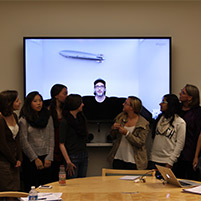Executive Producer of “The 100” Skypes Into Philosophy Class
By Emily Stimmel
 When Jason Rothenberg, creator and executive producer of the CW hit show “The 100,” found out that Carnegie Mellon University was offering a class on the philosophical questions the show raises, he immediately said he wanted to participate.
When Jason Rothenberg, creator and executive producer of the CW hit show “The 100,” found out that Carnegie Mellon University was offering a class on the philosophical questions the show raises, he immediately said he wanted to participate.
Earlier this week, 16 students in the freshman seminar “Philosophy and The 100” asked Rothenberg questions about the series via Skype. The show provides perfect fodder for a philosophy debate, as it is set 97 years after a nuclear war has wiped out most life on earth and 100 juvenile delinquents are sent back to explore what remains. Its elaborate internal mythology pits groups of survivors against each other, inviting viewers to question identity, the essence of humanity and what makes people “good” or “bad.”
The students asked Rothenberg about topics ranging from moral quandaries to the day-to-day work of writing and producing a TV show. Addressing the characters’ motivations and the ethical dilemmas that underpin the plot, Rothenberg described “The 100” as “’Lord of the Flies’ writ large.” He said he enjoys working in drama—science fiction in particular—because it affords him an opportunity to address political issues “without being preachy.”
Mara Harrell, who co-teaches the course with Philosophy Professor Clark Glymour, frequently draws from science fiction for freshman seminar themes. Previously, Harrell, associate teaching professor of philosophy, has used The Matrix, Star Trek and The Minority Report as popular culture lenses to examine philosophical questions and prompt discussion.
“Science fiction is especially good for presenting extreme situations that allow us to probe moral boundaries,” said Harrell.
She thought that Rothenberg’s participation in the class helped students link the show’s themes to the discipline of philosophy.
“We speculate a lot about the show as a way to make abstract philosophical principles accessible,” said Harrell. “It was helpful to have him here at the middle of the semester to help define driving concepts. It was reinvigorating.”
Nicole Korogodsky, who plans to major in neuroscience, was initially attracted to taking the class because of the focus on “The 100.” She now appreciates how she has learned to defend her positions on complex issues.
“I was excited about the connection to the show and being graded for conversations I’d usually have—I have lots of opinions! The class has been valuable for learning how to listen to other people’s opinions and make arguments to prove a point,” Korogodsky said.
“Philosophy and the 100” is just one of a broad sampling of freshman seminars offered by the Dietrich College of Humanities and Social Sciences. These special courses are designed to introduce students to an array of faculty with diverse research backgrounds while easing the transition from high school to college.
Three seminars each year are endowed by gifts to the college. “Philosophy and The 100” is the 2015 John C. Vassil Seminar, named after the late College of Engineering graduate who majored in chemical engineering and became a law partner at Moran-Finnegan LLP. The two others are the Frank Brunckhorst Seminar, funded by Brunckhorst, a CMU life trustee and head of Boar’s Head Provisions, which will be offered by the Center for the Neural Basis of Cognition this year, and the Richard Schoenwald Seminar that supports a course from the History Department in honor of the late and beloved history professor.
Students in “Philosophy and The 100” have more guest lectures to look forward to. On October 27, David J. Peterson will take part in another Skype conversation—this time about invented languages. Perhaps best known as the creator of Game of Thrones’ Dothraki language, Peterson also developed Trigedasleng, a form of Creole English spoken by the Grounders—the nuclear apocalypse survivors on the show. He will be joined by CMU’s Benjamin George, assistant professor of philosophy and an expert in linguistics and semantics.
“The 100” also has a direct connection to CMU. Javier Grillo-Marxuach (DC’91), a creative writing and cultural studies major, writes and produces.
Related: